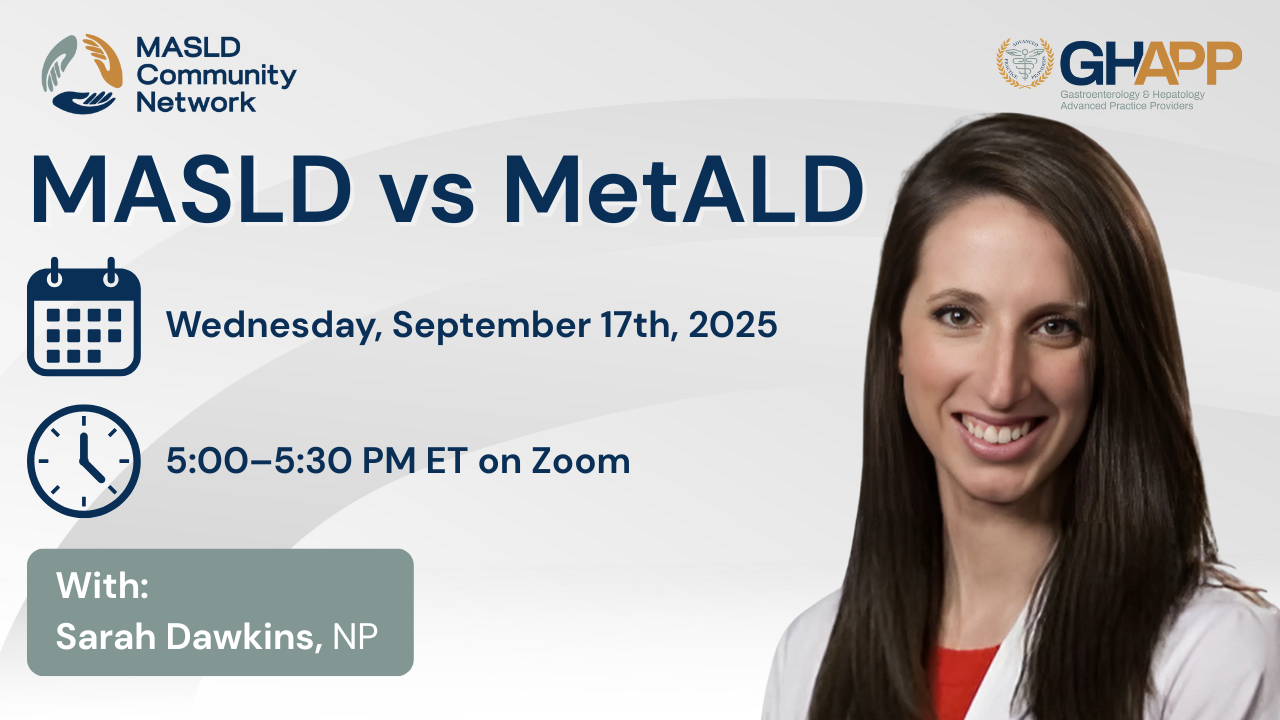
Sarah Dawkins
FNP-C, MSN, RN
Location : Durham, NC, USA
BIO
Sarah Dawkins, FNP-C, is a family nurse practitioner specializing in general and transplant hepatology at Duke University Medical Center, where she has practiced since 2017. She holds a BS in Biology and a BA in Romance Languages from the University of North Carolina at Chapel Hill. Sarah completed the Accelerated Bachelor of Science in Nursing (ABSN) program at Duke University and worked in the Neuroscience ICU at Duke while earning her Master of Science in Nursing (MSN). She became a certified family nurse practitioner in 2015 and initially worked in a private gastroenterology practice before joining Duke Gastroenterology.
Her clinical interests include autoimmune liver disease, transplant hepatology and metabolic dysfunction-associated steatotic liver disease (MASLD). Sarah currently serves as the Advanced Practice Provider (APP) Team Lead for the GI Division at Duke.
Outside of work, she enjoys traveling, trying new restaurants, attending fitness classes, cheering on the UNC Tar Heels, and spending time with her three young children and their orange cat, Zeus.
MASLD-MASH Content Featuring Sarah
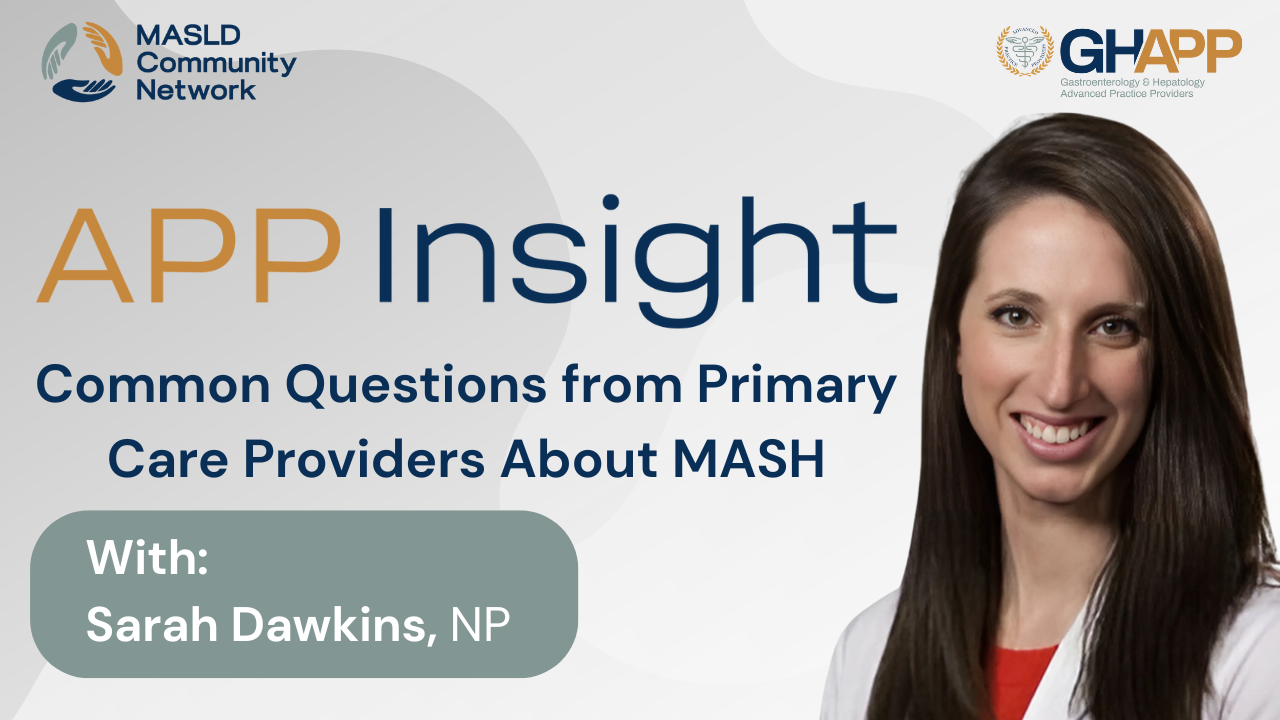
Common Questions From Primary Care Providers About MASH

Join Sarah Dawkins, NP, for quick and practical insights in this edition of GHAPP MASLD Community Network’s APP Insights. Sarah answers common questions from primary care providers about managing patients with hepatic steatosis on imaging but normal liver tests. She explains when to calculate a FIB-4 score, how to interpret mild ALT/AST abnormalities, and when referral to hepatology is necessary. Learn how to assess risk in patients with diabetes, obesity, or metabolic syndrome, and how to rule out other causes like viral hepatitis, alcohol use, drug-induced liver injury, and iron overload. Sarah emphasizes the importance of lifestyle counseling for low-risk patients and provides a clear framework for primary care providers to confidently monitor and manage MASLD without unnecessary referrals. A must-watch for anyone navigating the "gray zone" of liver diagnostics in everyday practice.
Watch Now

Non-Invasive Testing With Brian Lam

Join Brian Lam, PA-C, Associate Medical Director of Research at Inova’s Liver and Obesity Research Program and Chair of the Global NASH/MASH Council’s PA Committee, for a masterclass on non-invasive testing (NITs) in the evaluation of Metabolic Dysfunction-Associated Steatotic Liver Disease (MASLD) and MASH, presented through the GHAPP MASLD/MASH Community Network and sponsored by Madrigal Pharmaceuticals. In this dynamic and case-based session, Brian outlines a practical, step-by-step approach to identifying patients at risk for advanced fibrosis, using tools like FIB-4, ELF, FibroScan (VCTE), and MR Elastography. He walks through the critical cutoffs, diagnostic performance, limitations, and how to interpret imaging and lab-based scores in real-world hepatology and primary care settings. You'll learn how to apply AGA and AASLD clinical algorithms, the importance of staging patients with diabetes and metabolic syndrome, and how to distinguish low-risk MASLD from at-risk MASH. Brian also shares best practices for TE reliability, quality control, and using NIT combinations like FAST, MAST, and MEFIB for accurate diagnosis. With clear visuals, expert insights, and actionable takeaways, this session is an essential update for APPs, GI, hepatology, and primary care providers managing fatty liver disease in 2025 and beyond.
Watch Now
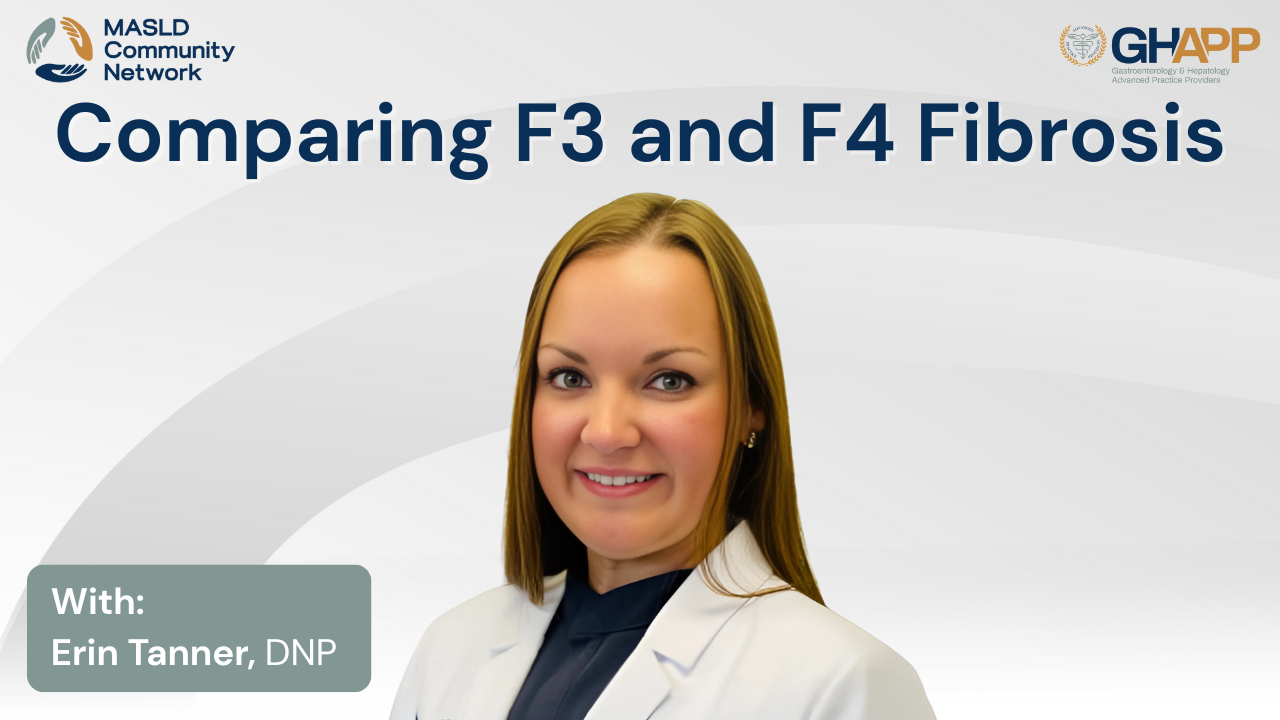
Comparing F3 and F4 Fibrosis With Erin Tanner

Join Erin Tanner, NP from Gastro Health in Birmingham, Alabama, for a practical and in-depth exploration of how to differentiate and manage patients with F3 versus F4 fibrosis in the setting of MASLD (Metabolic Dysfunction-Associated Steatotic Liver Disease) and MASH. This session, part of the MASLD & MASH Community Network, features two detailed case studies—Sam A and Sam B—who share identical comorbidities but diverge in fibrosis stage, illustrating how non-invasive testing (NITs) can guide diagnosis and treatment. Erin walks through the clinical application of tools like FIB-4, FibroScan (VCTE), ELF test, and CAP score, emphasizing the importance of interpreting lab and imaging results in context. The discussion covers key decision points, including when to initiate pharmacologic therapy like resmetirom (Rezdiffra), how to determine eligibility for HCC surveillance, and when to consider liver biopsy. She also addresses common challenges in community GI settings, such as incidental fatty liver findings, elevated ferritin levels, and the limitations of FIB-4 in older or diabetic patients. Whether you're in hepatology, gastroenterology, or primary care, this talk offers actionable insights on fibrosis staging, lifestyle counseling, and long-term monitoring in patients with MASLD and MASH.
Watch Now
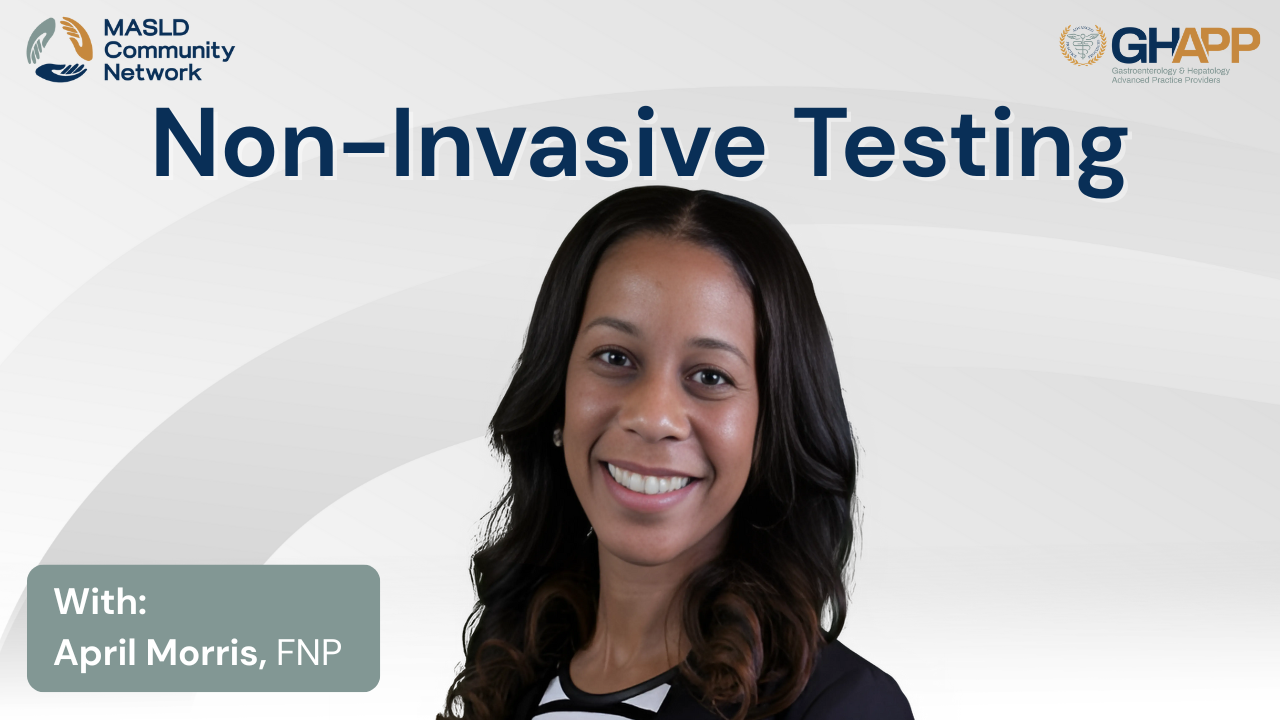
Non-Invasive Testing With April Morris

In this educational presentation, April Morris, FNP—an experienced provider in both liver disease and endocrinology—guides viewers through the evolving landscape of non-invasive testing (NITs) for diagnosing and managing patients with MASLD (Metabolic Dysfunction-Associated Steatotic Liver Disease) and MASH. Using the case of a 65-year-old male with metabolic co-morbidities and suspected liver disease, Morris reviews how to effectively apply tools like the FIB-4 score, ELF test, and FibroScan (VCTE) to assess fibrosis risk and stratify patients. She compares imaging modalities including transient elastography, MR elastography (MRE), and shear wave elastography, offering practical considerations such as patient eligibility, test accuracy, and insurance barriers. The discussion emphasizes the importance of interpreting NITs within clinical context—highlighting how to determine risk, guide patient counseling, and establish a follow-up plan for low-risk patients. This session also reinforces the role of primary care in longitudinal liver health management and directs providers to resources available through the GHAPP MASLD & MASH Community Network.
Watch Now
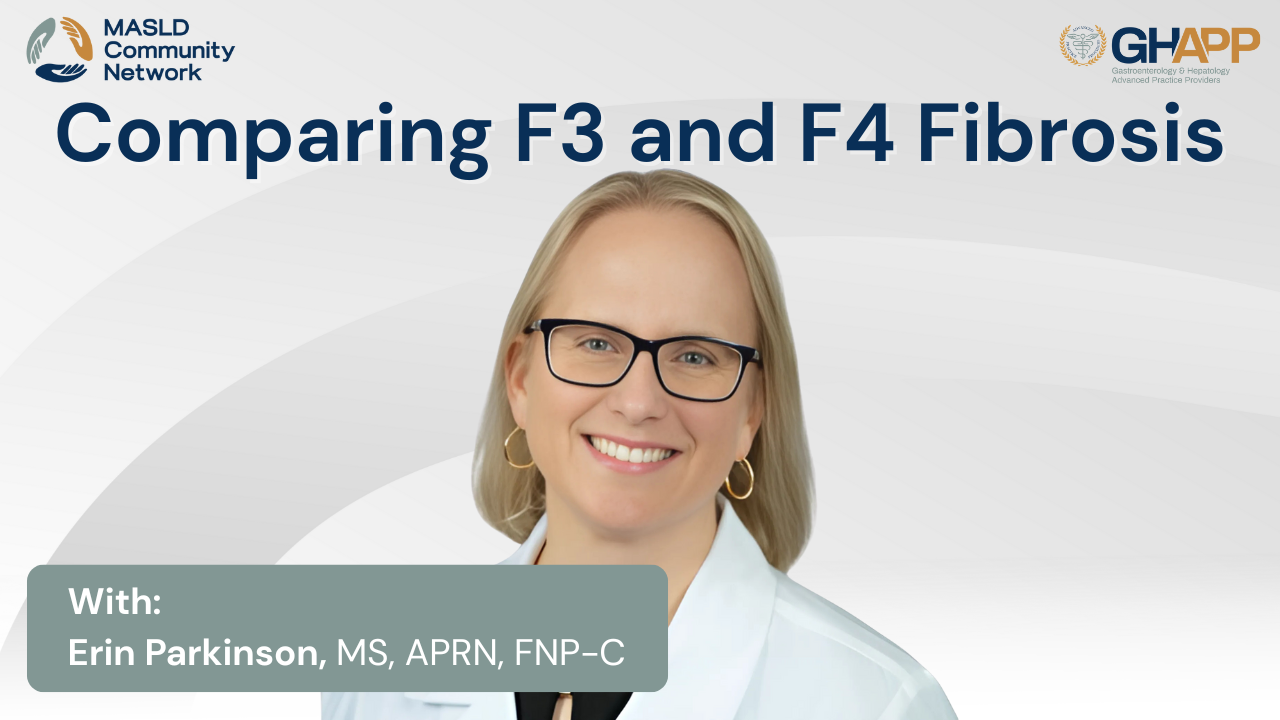
Comparing F3 and F4 Fibrosis With Erin Parkinson

In this in-depth clinical discussion, Erin Parkinson, NP from the Tampa General Medical Group Transplant Institute, walks through the nuanced process of differentiating stage 3 and stage 4 fibrosis in patients with MASLD (Metabolic Dysfunction-Associated Steatotic Liver Disease). Using two illustrative case studies, she explores key clinical signs, lab values, and non-invasive staging tools such as FibroScan, FIB-4, ELF score, and MR elastography. Parkinson discusses the importance of early identification of advanced fibrosis, the reversibility of stage 3 disease, and the implications of a diagnosis of cirrhosis. Erin outlines evidence-based treatment pathways including lifestyle interventions, use of GLP-1 receptor agonists, and initiation of resmetirom (Rezdiffra) for stage 2–3 fibrosis. For cirrhotic patients, the focus shifts to HCC surveillance, screening for clinically significant portal hypertension, and consideration of non-selective beta blockers like carvedilol. This video offers practical insights for hepatology providers navigating the evolving MASLD landscape and highlights how early intervention and accurate staging can impact long-term outcomes.
Watch Now
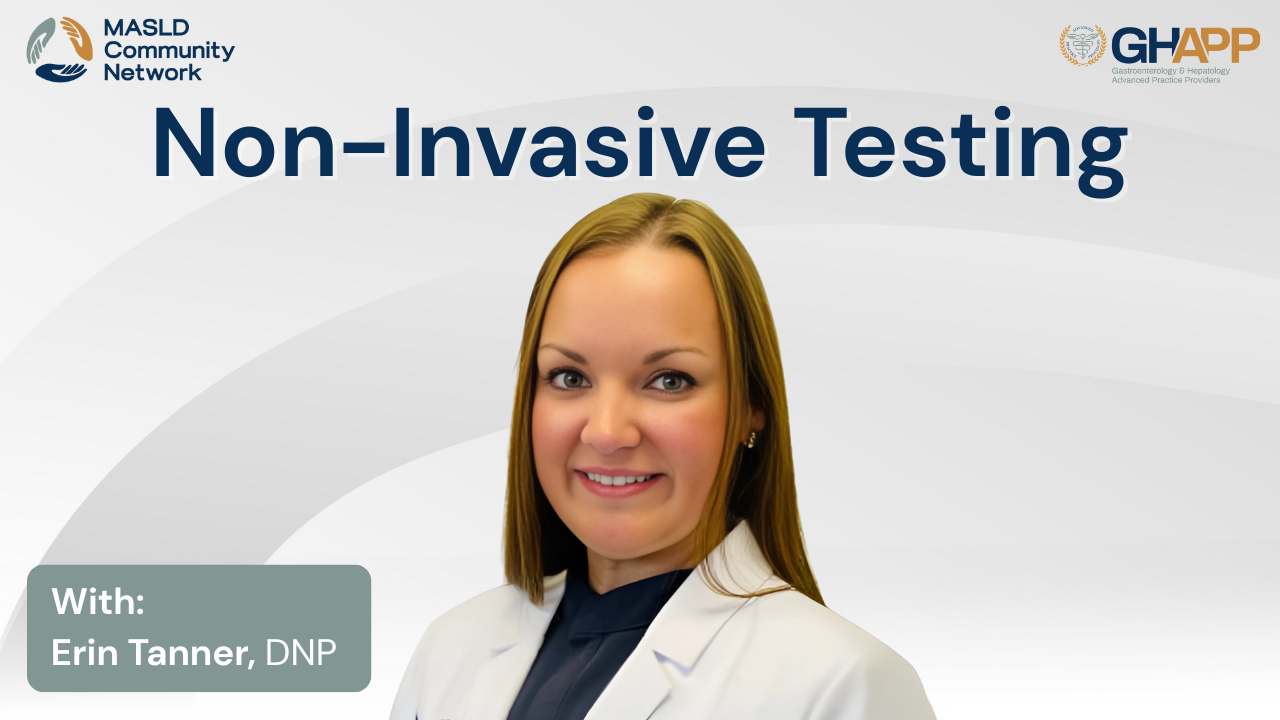
Non-Invasive Testing With Erin Tanner

In this educational session from the GHAPP MASLD & MASH Community Network, Erin Tanner, PA-C from Gastro Health in Birmingham, Alabama, presents a practical overview of non-invasive testing (NIT) options for evaluating and managing MASLD (Metabolic dysfunction-associated steatotic liver disease) and MASH (Metabolic dysfunction-associated steatohepatitis). Using a patient case study, Erin explores how clinicians can effectively utilize tools like FIB-4, FibroScan® (VCTE and CAP), ELF, MRE, and other emerging imaging and serum biomarkers to assess hepatic steatosis and fibrosis without the need for liver biopsy. The talk breaks down the pros, cons, and clinical accuracy of various NITs—including shear wave elastography, MRI-PDFF, and proprietary serum markers—and offers guidance on how to apply these tools in real-world hepatology and primary care settings. Special attention is given to identifying patients with metabolic risk factors, interpreting indeterminate FIB-4 scores, and knowing when to refer patients for further hepatology evaluation. Whether you’re new to liver disease management or looking to update your MASLD/MASH care pathways, this session offers clarity on how to stratify fibrosis risk and make informed clinical decisions using non-invasive diagnostics.
Watch Now
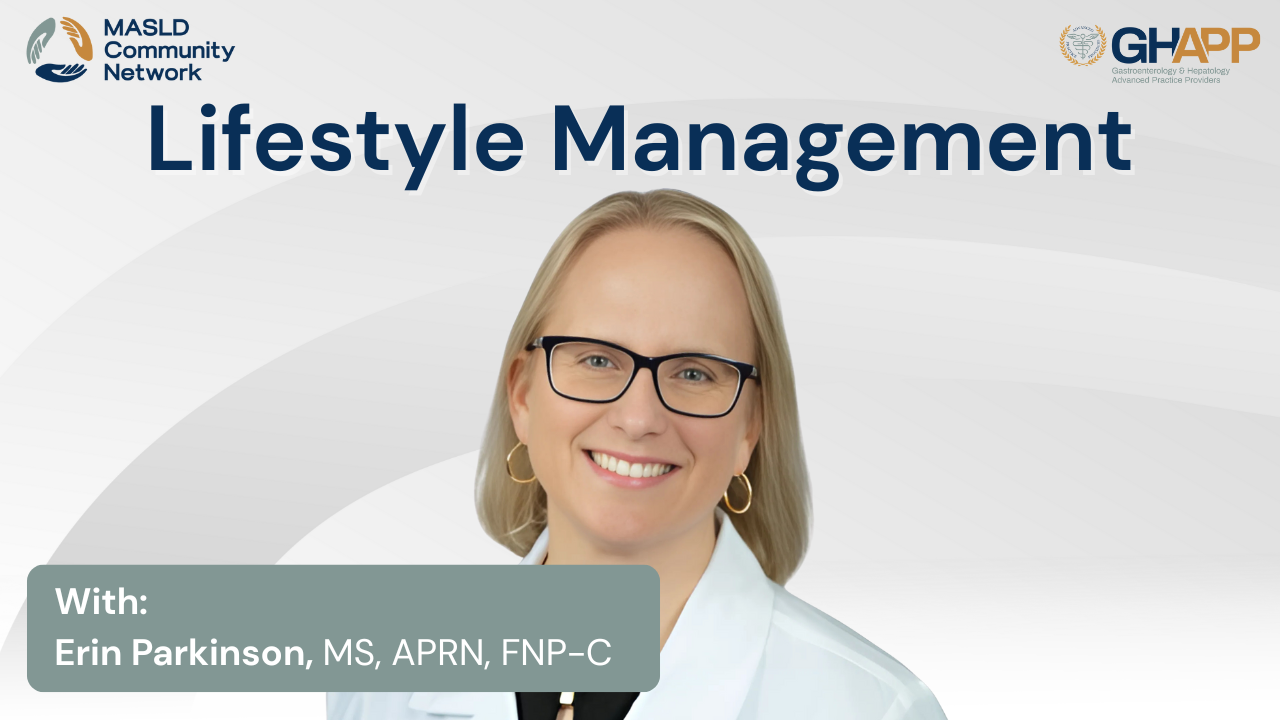
Lifestyle Management With Erin Parkinson

In this impactful session from the GHAPP MASLD Community Network, Erin Parkinson, NP, explores the vital role of lifestyle modifications in the management of MASLD (Metabolic dysfunction-associated steatotic liver disease) and MASH (Metabolic dysfunction-associated steatohepatitis). Through the lens of a real-world case study, Erin illustrates how clinical tools like FIB-4 and FibroScan® can be used to assess fibrosis risk and guide interventions for patients presenting with metabolic syndrome and hepatic steatosis. With a focus on practical, personalized care, this presentation highlights how diet, exercise, and culturally sensitive counseling can meaningfully reduce hepatic fat, inflammation, and fibrosis—key factors in preventing progression to cirrhosis or hepatocellular carcinoma. Erin discusses the impact of processed foods, high-fructose corn syrup, and sedentary behavior, while offering actionable guidance on introducing Mediterranean diets, intermittent fasting, and realistic exercise goals tailored to individual readiness and barriers. Whether you're a hepatology specialist, primary care provider, or obesity medicine clinician, this talk delivers tools to better support patients with MASLD/MASH through sustainable behavioral change and longitudinal follow-up.
Watch Now
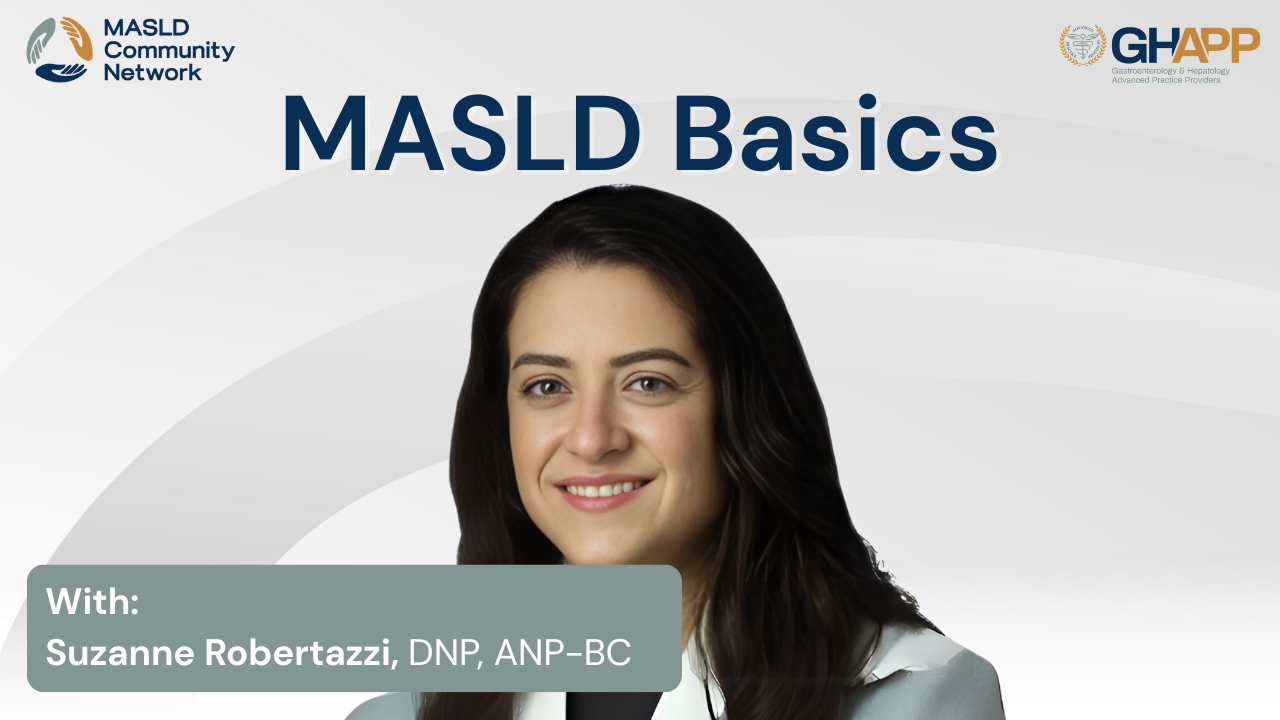
MASLD Basics With Suzanne Robertazzi

Join Suzanne, a nurse practitioner from the Washington DC VA Medical Center, as she kicks off a comprehensive lecture series on steatotic liver disease, focusing on the evolving understanding of MASLD (Metabolic dysfunction-associated steatotic liver disease) and MASH (Metabolic dysfunction-associated steatohepatitis). In this foundational session, Suzanne walks through the new nomenclature replacing NAFLD and NASH, and outlines the clinical criteria used to identify and stratify patients along the MASLD–MASH spectrum. Learn how metabolic risk factors such as obesity, prediabetes, hypertension, and dyslipidemia contribute to disease progression, and explore the use of non-invasive diagnostic tools like Fib-4, FibroScan, and ELF scores to assess fibrosis. The session also discusses indications for liver biopsy, the implications of overlapping etiologies (like alcohol-associated liver disease), and strategies for identifying patients at high risk for cirrhosis, hepatocellular carcinoma (HCC), and liver-related mortality. This lecture equips clinicians, particularly those in primary care and hepatology, with a practical framework to evaluate steatosis, interpret metabolic profiles, and determine when to refer patients for specialty care. Whether you're new to liver disease or looking for updates on MASLD and MASH terminology, this session is an essential starting point.
Watch Now

Management of Life Style Modification

This video focuses on the comprehensive management of patients with metabolic-associated steatohepatitis (MASH), emphasizing lifestyle modifications, dietary adjustments, and exercise strategies. Key topics include the importance of addressing risk factors like diet, exercise habits, and alcohol intake, as well as referrals to medically supervised weight loss clinics or bariatric surgery for advanced cases. The speaker highlights the benefits of the Mediterranean diet, intermittent fasting, and avoiding ultra-processed foods while discussing the role of resistance training to combat sarcopenia and maintain muscle mass. Practical advice and tailored recommendations ensure a holistic approach to managing MASH and improving patient outcomes.
Watch Now

Third Step of Life Style Management

This video provides a comprehensive overview of emerging pharmacologic treatments for metabolic-associated steatohepatitis (MASH) and their tailored applications based on patient profiles. Topics include FDA-approved therapies, drugs in advanced clinical trials (such as semaglutide and lanifibranor), and the potential for combination treatments targeting both steatohepatitis and fibrosis. The speaker emphasizes the importance of patient-specific approaches considering metabolic profiles, obesity, and diabetes status, alongside lifestyle interventions. Additionally, the video discusses the evolving interdisciplinary care model and highlights the exciting progress in non-invasive testing and treatment advancements for F2-F3 fibrosis.
Watch Now

Approved Medication for MASH/NASH

This video provides detailed guidance on selecting and monitoring patients for emerging therapies targeting advanced fibrosis (F2-F3) in NASH. Key topics include contraindications for patients with cirrhosis, considerations for concomitant medications, and dose adjustments for statins. The video outlines ideal candidates based on specific thresholds for VCTE, MRE, ELF scores, and other non-invasive tests while emphasizing the importance of ruling out portal hypertension and other liver diseases. It also reviews a stepwise monitoring approach, focusing on tolerability at three months and efficacy assessments at six and twelve months, with an emphasis on histologic and non-invasive test improvements.
Watch Now

Types of Diet for the Treatment of MASLD

This video explores comprehensive strategies for managing metabolic-associated steatohepatitis (MASH), focusing on fibrosis risk stratification, lifestyle modifications, and pharmacologic interventions. Learn about dietary recommendations like the Mediterranean diet, exercise guidelines emphasizing resistance training, and the role of intermittent fasting and processed food avoidance. The video also highlights weight loss targets, diabetes management, and emerging therapies such as GLP-1 receptor agonists and bariatric surgery, all aimed at improving liver health and patient outcomes.
Watch Now

NITs to Identify High Risk MASH Patients

Explore advancements in non-invasive diagnostics and risk stratification for liver fibrosis and MASH. This video highlights tools like FIB-4, transient elastography, and innovative scoring systems (e.g., FAST and Agile) to identify and predict outcomes for high-risk patients. Learn about serum biomarkers, updated guidelines, and the role of lifestyle interventions alongside targeted therapies for managing metabolic risks and advancing care in hepatology.
Watch Now
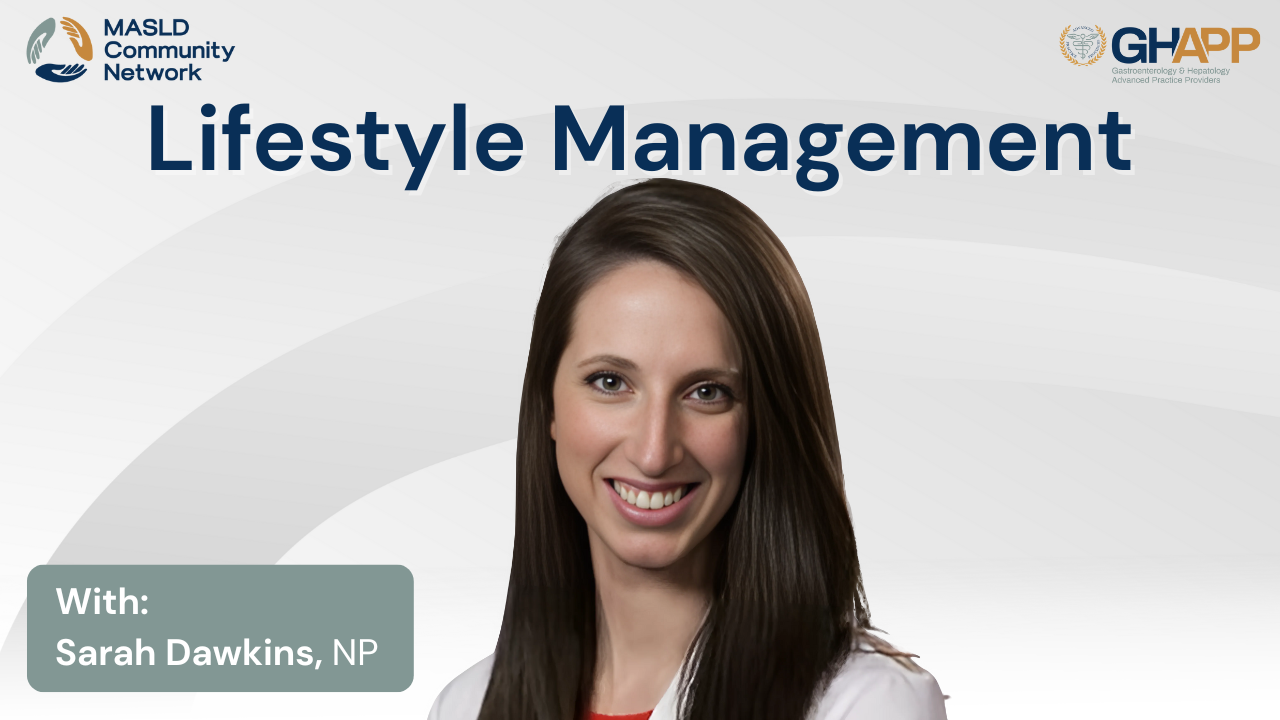
Lifestyle Management With Sarah Dawkins

Join Sarah Dawkins, NP, for an in-depth and inspiring conversation on lifestyle management for MASLD (Metabolic Dysfunction-Associated Steatotic Liver Disease) and MASH (Metabolic Dysfunction-Associated Steatohepatitis), presented through the GHAPP MASLD Community Network and sponsored by Madrigal Pharmaceuticals. In this engaging session, Sarah uses the real-world case of "Albert" to explore how to assess fibrosis risk using non-invasive testing like FIB-4 and FibroScan, and why lifestyle interventions remain the cornerstone of care for patients without advanced fibrosis. Through a patient-centered lens, she outlines practical strategies for addressing dietary counseling, exercise goals, and culturally sensitive approaches to nutrition—highlighting how individualized care, family involvement, and positive reinforcement can create meaningful behavior change. The session dives into the science behind genetic risk factors like PNPLA3, the role of central obesity in inflammation, and the impact of Western diets on liver health. Sarah also reviews the Mediterranean diet, exercise recommendations, and evidence-based interventions, including the benefits of aerobic + resistance training over HIIT for MASLD improvement. With clinical pearls on motivational interviewing, overcoming barriers to access, and the use of tools like the Exercise and Diet Adherence Scale (EDAS), this session empowers providers to make lifestyle conversations impactful—even when time is short.
Watch Now
FAQ's

Common Questions From Primary Care Providers About MASH

Join Sarah Dawkins, NP, for quick and practical insights in this edition of GHAPP MASLD Community Network’s APP Insights. Sarah answers common questions from primary care providers about managing patients with hepatic steatosis on imaging but normal liver tests. She explains when to calculate a FIB-4 score, how to interpret mild ALT/AST abnormalities, and when referral to hepatology is necessary. Learn how to assess risk in patients with diabetes, obesity, or metabolic syndrome, and how to rule out other causes like viral hepatitis, alcohol use, drug-induced liver injury, and iron overload. Sarah emphasizes the importance of lifestyle counseling for low-risk patients and provides a clear framework for primary care providers to confidently monitor and manage MASLD without unnecessary referrals. A must-watch for anyone navigating the "gray zone" of liver diagnostics in everyday practice.
Watch Now







